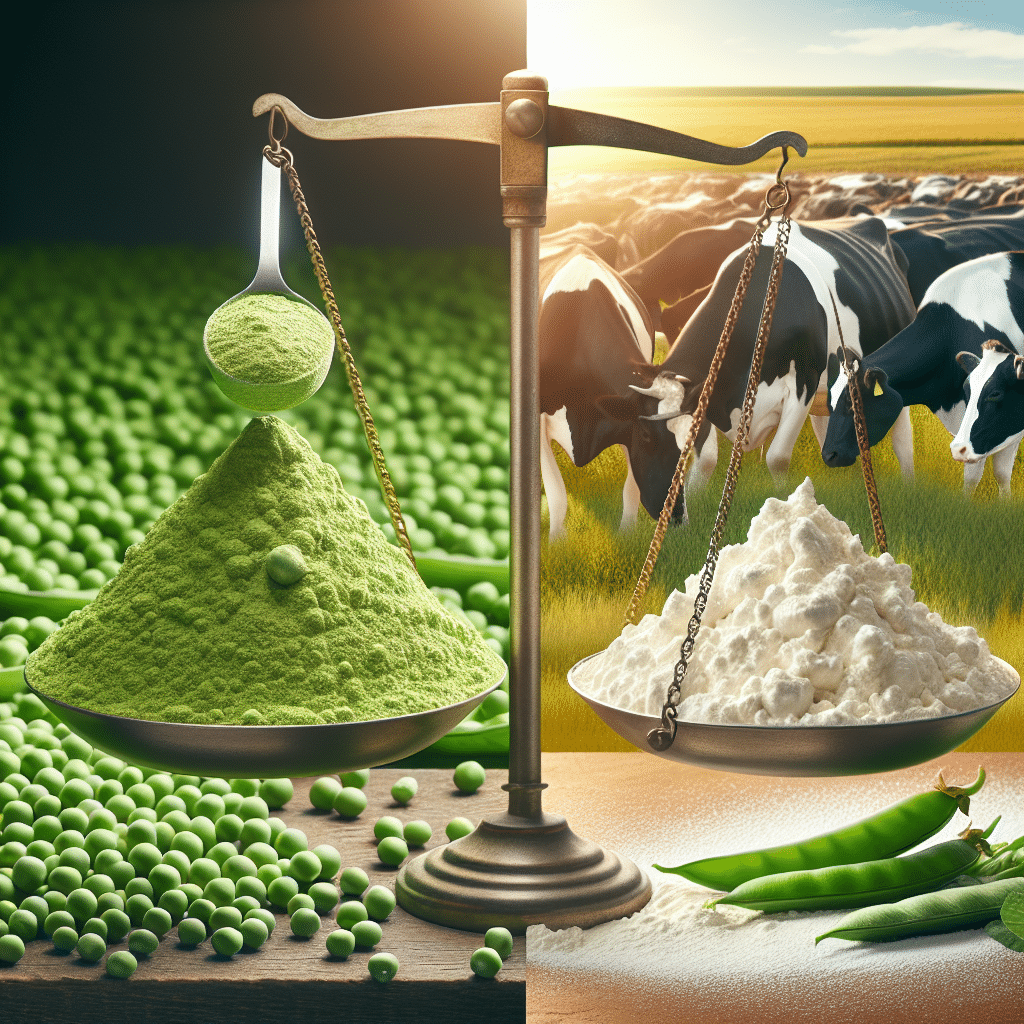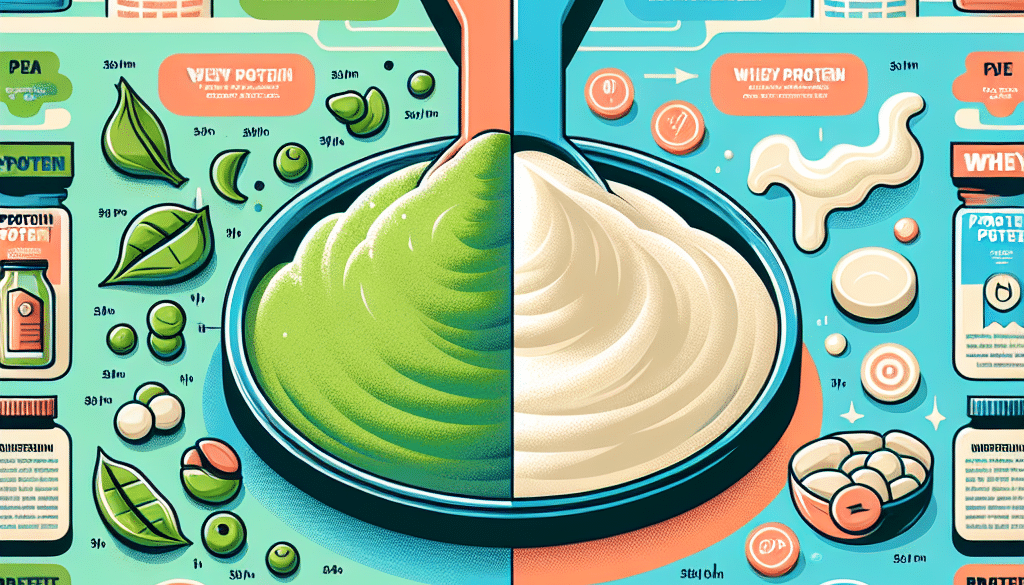Which Is Better Pea Or Whey Protein? Discover More
Table of Contents
- Pea vs. Whey Protein: Which Is the Superior Protein Supplement?
- Understanding Protein Supplements
- What Is Whey Protein?
- What Is Pea Protein?
- Nutritional Comparison
- Digestibility and Absorption
- Allergies and Intolerances
- Environmental Impact
- Case Studies and Research
- Personal Preferences and Lifestyle Choices
- Conclusion: Weighing Your Options
- Discover ETprotein’s Premium Protein Products
Pea vs. Whey Protein: Which Is the Superior Protein Supplement?

When it comes to protein supplements, the debate between pea and whey protein is ongoing. Both have their unique benefits and can be suitable for different types of individuals with varying dietary needs and fitness goals. In this article, we will delve into the specifics of pea and whey protein, comparing their nutritional profiles, digestibility, environmental impact, and more to help you determine which might be the better option for you.
Understanding Protein Supplements
Protein supplements are a convenient way to increase your protein intake, especially if you have higher requirements due to an active lifestyle, muscle building, or certain dietary restrictions. They come in various forms, but the most popular are powders that can be mixed with water, milk, or incorporated into smoothies and recipes.
What Is Whey Protein?
Whey protein is a by-product of cheese production and is a complete protein, meaning it contains all nine essential amino acids. It’s known for its high digestibility and rapid absorption, making it a favorite among athletes and bodybuilders.
What Is Pea Protein?
Pea protein is derived from yellow split peas and is a high-quality alternative to animal-based proteins. It’s rich in branched-chain amino acids (BCAAs), particularly arginine, which is beneficial for heart health and circulation.
Nutritional Comparison
- Amino Acid Profile: Whey protein contains a slightly higher concentration of essential amino acids, particularly leucine, which is crucial for muscle protein synthesis. Pea protein, while slightly lower in some amino acids, is still considered a complete protein.
- Protein Content: Both whey and pea proteins typically offer around 20-30 grams of protein per serving, depending on the brand and formulation.
- Carbohydrates and Fats: Whey protein often contains lactose, a milk sugar, which can be problematic for those with lactose intolerance. Pea protein is naturally lactose-free and usually has lower fat content.
Digestibility and Absorption
Whey protein is renowned for its rapid absorption rate, which is ideal post-workout. Pea protein digests more slowly, providing a steady release of amino acids. This can be advantageous for sustained energy and satiety.
Allergies and Intolerances
Whey protein is not suitable for vegans and can cause issues for those with lactose intolerance or milk allergies. Pea protein is hypoallergenic and free from common allergens like gluten, soy, and dairy, making it a safe choice for many individuals with dietary restrictions.
Environmental Impact
The production of pea protein generally has a lower environmental footprint compared to whey protein. Pea crops require less water and can fix nitrogen in the soil, reducing the need for synthetic fertilizers. Dairy farming, on the other hand, is associated with higher greenhouse gas emissions and water usage.
Case Studies and Research
Several studies have compared the effects of pea and whey protein on muscle growth and recovery. A 2015 study published in the Journal of the International Society of Sports Nutrition found that pea protein promoted muscle thickness gains just as effectively as whey protein in participants involved in a 12-week resistance training program.
Personal Preferences and Lifestyle Choices
Choosing between pea and whey protein often comes down to personal preferences and lifestyle choices. Vegans and those with certain allergies will gravitate towards pea protein, while those who prioritize rapid absorption may prefer whey protein.
Conclusion: Weighing Your Options
In conclusion, both pea and whey protein have their merits. Whey protein may edge out slightly in terms of amino acid profile and absorption rate, making it a long-standing favorite among athletes. However, pea protein’s hypoallergenic properties and lower environmental impact make it an excellent choice for those with dietary restrictions and environmental concerns.
Ultimately, the decision between pea and whey protein should be based on your dietary needs, fitness goals, and ethical considerations. Both can be part of a balanced diet and contribute to muscle development and recovery.
Discover ETprotein’s Premium Protein Products
If you’re looking for high-quality protein supplements, consider ETprotein’s range of products. They offer both pea and whey protein options to cater to various dietary preferences and needs. With a focus on purity and quality, ETprotein ensures that you’re getting the best supplement to support your health and fitness journey.
About ETprotein:
ETprotein, a reputable protein and L-(+)-Ergothioneine (EGT) Chinese factory manufacturer and supplier, is renowned for producing, stocking, exporting, and delivering the highest quality organic bulk vegan proteins and L-(+)-Ergothioneine. They include Organic rice protein, clear rice protein, pea protein, clear pea protein, watermelon seed protein, pumpkin seed protein, sunflower seed protein, mung bean protein, peanut protein, and L-(+)-Ergothioneine EGT Pharmaceutical grade, L-(+)-Ergothioneine EGT food grade, L-(+)-Ergothioneine EGT cosmetic grade, L-(+)-Ergothioneine EGT reference grade and L-(+)-Ergothioneine EGT standard. Their offerings, characterized by a neutral taste, non-GMO, allergen-free attributes, with L-(+)-Ergothioneine purity over 98%, 99%, cater to a diverse range of industries. They serve nutraceutical, pharmaceutical, cosmeceutical, veterinary, as well as food and beverage finished product distributors, traders, and manufacturers across Europe, USA, Canada, Australia, Thailand, Japan, Korea, Brazil, and Chile, among others.
ETprotein specialization includes exporting and delivering tailor-made protein powder and finished nutritional supplements. Their extensive product range covers sectors like Food and Beverage, Sports Nutrition, Weight Management, Dietary Supplements, Health and Wellness Products, and Infant Formula, ensuring comprehensive solutions to meet all your protein needs.
As a trusted company by leading global food and beverage brands and Fortune 500 companies, ETprotein reinforces China’s reputation in the global arena. For more information or to sample their products, please contact them and email sales(at)ETprotein.com today.












